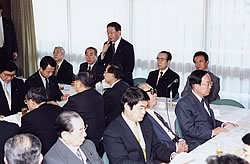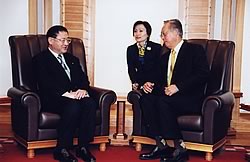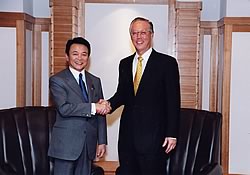|
||
|
The Head of Cabinet for the European Union (EU) meets Yoichi Masuzoe, Member of the House of Councillors. |
||
| On March 11, Peter Tempel, the Head of Cabinet for Gunter Verheugen's Commission for Enlargement, visited Yoichi Masuzoe at the Member's Office Building of the House of Councillors to exchange views on the world situation, including the issues of Iraq and North Korea. First of all, Mr. Masuzoe explained Japanese policy regarding Iraq by saying that "the Iraqi problem is linked to the North Korean situation and there are no grounds to oppose United States policy." Mr. Temple explained the situation in the EU and noted that there is a division within the EU between those who support and those who oppose policy with respect to Iraq, so it is a time of trial for the EU. "It is a very difficult situation since there is little room for common ground." With respect to the North Korean situation, Mr. Masuzoe suggested that "several European countries have embassies in Pyongyang and thus may be in a position to exert some influence. We wish to cooperate with them and utilize their services to deal with the nuclear and abduction issues that confront us." In addition, he said, "I have a feeling that the Japanese-EU political dialogue has become somewhat superficial while our common concerns have shallowed somewhat. It is time to deepen our dialogue." Mr. Tempel agreed, "we should expand our dialogue." |
||
|
The Families of Abduction Victims Meet with Foreign Diplomats |
||
| On March 12, the LDP's International Bureau (Director General Toshitsugu Saito, Member of the House of Representatives) hosted the Nagata-kai, a study session organized for Japanese-speaking diplomats, at the LDP Headquarters. Four members of the Association of the Families of Victims Kidnapped by North Korea (FVKN) - Shigeru and Sakie Yokota (Megumi Yokota's parents), Toru Hasuike (Kaoru Hasuike's brother) and Teruaki Masumoto (brother of Rumiko Masumoto) - were invited to speak with foreign diplomats. In attendance were diplomats and international relations scholars from more than twenty countries, which is an indication of a growing concern for this issue overseas. The meeting was presided over by Shoichi Nakagawa, Representative of the Parliamentarian League for Early Repatriation of Japanese Citizens Kidnapped by North Korea and Chairman of LDP Headquarters, and attended by Katsuei Hirasawa, Chief Secretary of the Parliamentary League. In his opening remarks, Chairman Nakagawa said, "the abduction issue has made a wide appeal to international opinion and I would like to ask the representatives at this meeting to try to fathom the misery caused by this issue and its gravity". Each of the family members talked about how the abductions took place as well as the emotional impact upon everyone. The family members spoke in accord at the shock of how 'an average Japanese civilian could be forcibly abducted to a foreign country and then disappear for decades. The lack of explanation for this act has been a continuous hell for both the victims and families'. With respect to the many questions surrounding the situation of the abductions, the safety of family members remaining in North Korea, and the problems of nuclear development and missile tests, Director General Saito concluded by saying, "the LDP's International Bureau endeavors to do all it can to apply international pressure on North Korea so as to win them over." |
||
|
Meeting between the American Embassy and Members of the Diet to Discuss the Iraq Issue |
||
| On March 12, the Assistant Director of the United States Embassy's Political Section, Daniel Shields, was invited to attend a Diet Members study session on the tense Iraq problem. Mr. Shields indicated his dissatisfaction with regard to the Iraq situation by stating, "last year Security Council Resolution 1441 was adopted to enable inspections. Currently, inspections are underway but there are indications of non-cooperation from the standpoint of the elimination of armaments. In this regard, little progress has been made under United Nations auspices for the last twelve years since the Gulf War ceasefire". Moreover, Mr. Shields said that the threat of biological and chemical weapons exists since 'Iraq currently possesses 25000 tons of anthrax, 28000 tons of botulism, and 500 tons of sarin gas'. Mr. Shields expressed his desire that Japan find its own way to contribute to the Iraq issue. The Diet Members responded, "since the financial situation is difficult, it is preferable that the United States thinks of an appropriate contribution." Furthermore, Mr. Shields reiterated United States policy that there is a possibility that a new resolution could extend the deadline but it would be difficult to allow for more than a month. "We wish to solve this problem as soon as possible," he added. |
||
|
Successive Discussions with the French and European Union Ambassadors in Japan regarding the Iraq Issue |
||
| At the invitation of the LDP's International Bureau, the French Ambassador to Japan, Bernard de Montferrand, attended a discussion on March 18th followed by a visit by the European Union's Ambassador to Japan, Bernhard Zepter, on March 19th. First of all, Ambassador Montferrand criticized the use of force by the United States-United Kingdom alliance in Iraq by saying, "we are against the use of force. The inspections produced results and if we had continued with this route, we believe that we could have achieved the just disarmament of Iraq." Moreover, he expressed his fears with regard to the effects of attack on Iraq by saying "this is capable of having an influence on international order. It may bring about a clash of cultures." On the other hand, Ambassador Zepter touched upon the European Union's future after the Iraq war. "With regard to this Iraq war, there is some disagreement within the European Union but it will help progress the debate on a common security policy." |
||
|
First Meeting of the Emergency Headquarters for the Iraq Issue |
||
First of all, Chairman Yamasaki started the meeting by saying "while it is a troubling choice to make, we agree with the use of force. We wish for a speedy end to the war." Then Deputy Chief Cabinet Secretary Abe explained current policy with respect to the Iraq issue. He included statements on the safety of Japanese nationals in countries in the vicinity of Iraq; emergency humanitarian assistance to affected people; economic assistance to nations in the Middle East affected by the war; strengthening of precautions for the protection of important facilities, national monuments and military establishments; protection of port facilities; and assistance for the reconstruction of Iraq. Diet Members also expressed concerns relating to the linkage of the Iraq and North Korean issues and the necessity to support the United States' decision to disarm Iraq from the viewpoint of the United States - Japan Security Treaty. |
||
|
LDP Secretary General Yamasaki and Policy Affairs Research Council Chairman Aso meet in succession with Singaporean Prime Minister Goh |
||
On March 26, LDP Secretary General Taku Yamasaki and Policy Affairs Research Council Chairman Taro Aso met Singaporean Prime Minister Goh Chok Tong in two separate meetings at a downtown hotel.
Prime Minister Goh replied, "Singapore too expressed its support for the war in Iraq. In the same way that Japan is burdened with the North Korean issue, Singapore is very concerned about terrorism. ASEAN hopes to solve the North Korean issue through mutual cooperation and policies such as anti-terror measures." Moreover, Secretary General Yamasaki and Prime Minister Goh agreed that the reconstruction of Iraq should be conducted through the United Nations.
|
||
|
South Korean Foreign Minister Yoon Young-kwan meets with the Ruling Parties' Three Secretary Generals. |
||
| On March 31, Taku Yamasaki of the LDP, Tetsuzo Fuyushiba of the New Komeito and Toshihiro Nikai of the New Conservative Party met with the South Korea Foreign Minister Yoon Young-kwan in the Diet. Foreign Minister Yoon also met with Prime Minister Koizumi and Foreign Minister Kawaguchi before embarking on a trip to the United States. Secretary General Yamasaki asked "your visit to Japan comes at a time of the United States - United Kingdom Alliance's attack on Iraq and rising tensions with North Korea. In view of Japan's support of the war against Iraq, we are interested to know the position of the South Korean Parliament with respect to the decision to dispatch military engineers to the region." Foreign Minister Yoon replied, "I am aware that some segments of public opinion are against the Iraq war, but Korean - American relations are extremely important for peace and security on the Korean peninsula. Prime Minister Roh Moo-hyun will appeal to the public's understanding over the appropriateness of the decision." Moreover, Foreign Minister Yoon said with respect to the North Korean problem, "we are hoping for a peaceful resolution through discussion. Thus it is important to strengthen ties among South Korea, Japan and the United States." Secretary General Yamasaki suggested, "not only is the relationship among South Korea, Japan and United States important, but we should also strengthen ties with China, Russia, the United Nations Security Council and the Association of Southeast Asian Nations (ASEAN)." Finally, Foreign Minister Yoon stated that many forthcoming issues are accumulating, which will require cooperation with Japan and firm resolve. |
News
Monthly News for April, 2003
April 24, 2003














